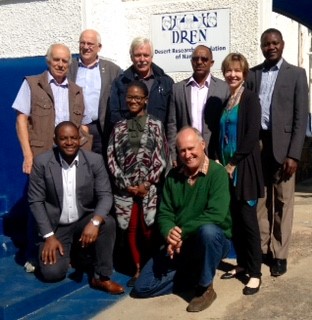Implementing Partners
DRFN: Applying Environmental, Social and Gender Principles to Enhance Climate Change Adaptation Projects in Namibia
By Dr. Martin Schneider, Executive Director, DRFN
Achieving accreditation as the National Implementing Entity (NIE) for Namibia with the Adaptation Fund has strengthened the capacity of the Desert Research Foundation of Namibia (DRFN) to address climate change-related issues in a more holistic manner together with other institutions locally and within the Southern Africa Region.
The relationship with the government’s national Designated Authority (DA) to the Fund, as well as with decision-making bodies (Parliament, Local and Regional Government Institutions) further improved this capacity, as did networking through social media.
Since the introduction of the Adaptation Fund’s Climate Finance Readiness Programme and small technical assistance and south-south grants offered through it, considerable awareness campaigns have taken place together with other civil society organizations in Namibia. A very important aspect is the capacity building of NIE staff, which during 2017 included a training workshop with the aim to produce an Environmental, Social and Gender Policy for DRFN, based on the Fund’s policies in these areas that strive to incorporate human rights, gender equality, biodiversity and habitat conservation in projects funded by the Adaptation Fund. This document is downloadable through the website of the DRFN and continues to attract great interest among stakeholders and NGOs in Namibia.
Collaboration on an Adaptation Fund Technical Assistance Grant Project
Building on a 2013 Memorandum of Agreement between the DRFN and the International Arid Lands Consortium (IALC), a collaborative proposal was submitted to the Adaptation Fund in August of 2016 in response to the Fund’s “Call for Technical Assistance Grants for NIEs to Build Capacity to Mitigate Environmental, Social and Gender-related Risks.”
In January 2017, the grant was awarded to DRFN, and IALC consultants Dr. Barbara Hutchinson and Kristin Wisneski-Blum initiated project activities soon after. This involved employing user-experience research methods to develop a policy manual, which included the following components:
- Guidelines for screening projects for environmental, social, and gender (ESG) risks
- Guidelines for ESG risk assessments and management plans
- Checklist for public disclosure and gender-responsive consultation
- Guidelines for ESG-responsive grievance mechanisms
Overall, the purpose of the grant was to strengthen capacity to implement the Fund’s ESG policies. The aim was also to allow potential executing entities (EEs) and partners of DRFN, as well as the DA – which is the Ministry of Environment and Tourism – to discuss strategies for improving the competitiveness of current adaptation project proposals in development. The concepts have been endorsed by the Adaptation Fund Board, and are being developed further into full project proposals. One of these concepts aims to test a pilot desalination plant with renewable power for improving and ensuring the supply of good quality groundwater to small towns and villages, while the other seeks to strengthen adaptive capacities and enhance resilience of vulnerable farming systems to include adaptive crop systems and efficient irrigation technologies. It is hoped that once the final projects are approved they will improve resilience of these communities in Namibia against the increased variability in rainfall that is expected with climate change.
To this end, virtual interviews were held with NIE staff members and extensive research conducted on the Adaptation Fund’s ESG-related policies and procedures, as well as international and national laws and regulations. The results of these efforts are included in a final manual provided to DRFN as well as in the workshop training presentations. The primary context for integrating ESG into project design and implementation is the DRFN’s Environmental and Social Management System (ESMS), which is composed of the steps outlined below. Each step was described in detail in the prepared manual and referenced in project components and steps, such as project formulation, proposal development, and project implementation. The steps include:
- Environmental, social, and gender risk identification through a screening process
- Environmental, social, and gender assessment
- Development of environmental and social management plans
- Environmental, social, and gender management monitoring, reporting, and evaluation
- Public disclosure and consultation (stakeholder engagement)
- Grievance mechanism
The culmination of this technical assistance was a four-day in-country workshop for NIE staff members covering Adaptation Fund ESG policies and procedures, held from May 29 – June 1, 2017.
It is capacity building activities and inclusive stakeholder engagement policies like these that originated from the Adaptation Fund and were incorporated into DRFN’s work processes that will make its adaptation project proposals and responses to climate change issues affecting the country considerably more effective and stronger. With warming temperatures, less rainfall and a rise in forest-cutting compounding Namibia’s vulnerability to climate change, DRFN is well-positioned through the Adaptation Fund’s pioneering Direct Access modality to make positive change in the country. Direct Access allows DRFN to develop effective adaptation projects for vulnerable communities and access finance directly through the Adaptation Fund, while helping to build Namibia’s national capacity to adapt to climate change over the long run.

Participants of the Environmental, Social and Gender Policy Workshop held in Namibia in May 2017. Pictured from left standing: Mr. Olla Aldrich (DRFN; left, standing), Dr. Jack Elliott (TAMU), Dr. Martin Schneider (DRFN), Prof. Mutjinde Katjiua (NUST), Dr. Barbara Hutchinson (IALC), Mr. Sion Shifa (Ministry of Environment and Tourism: AF Designated Authority). Pictured front left to right: Mr. Salomo Mbai (NUST), Ms. Ester Nangolo (UNAM), and Dr. Axel Rothauge (AgriConsult Namibia).


